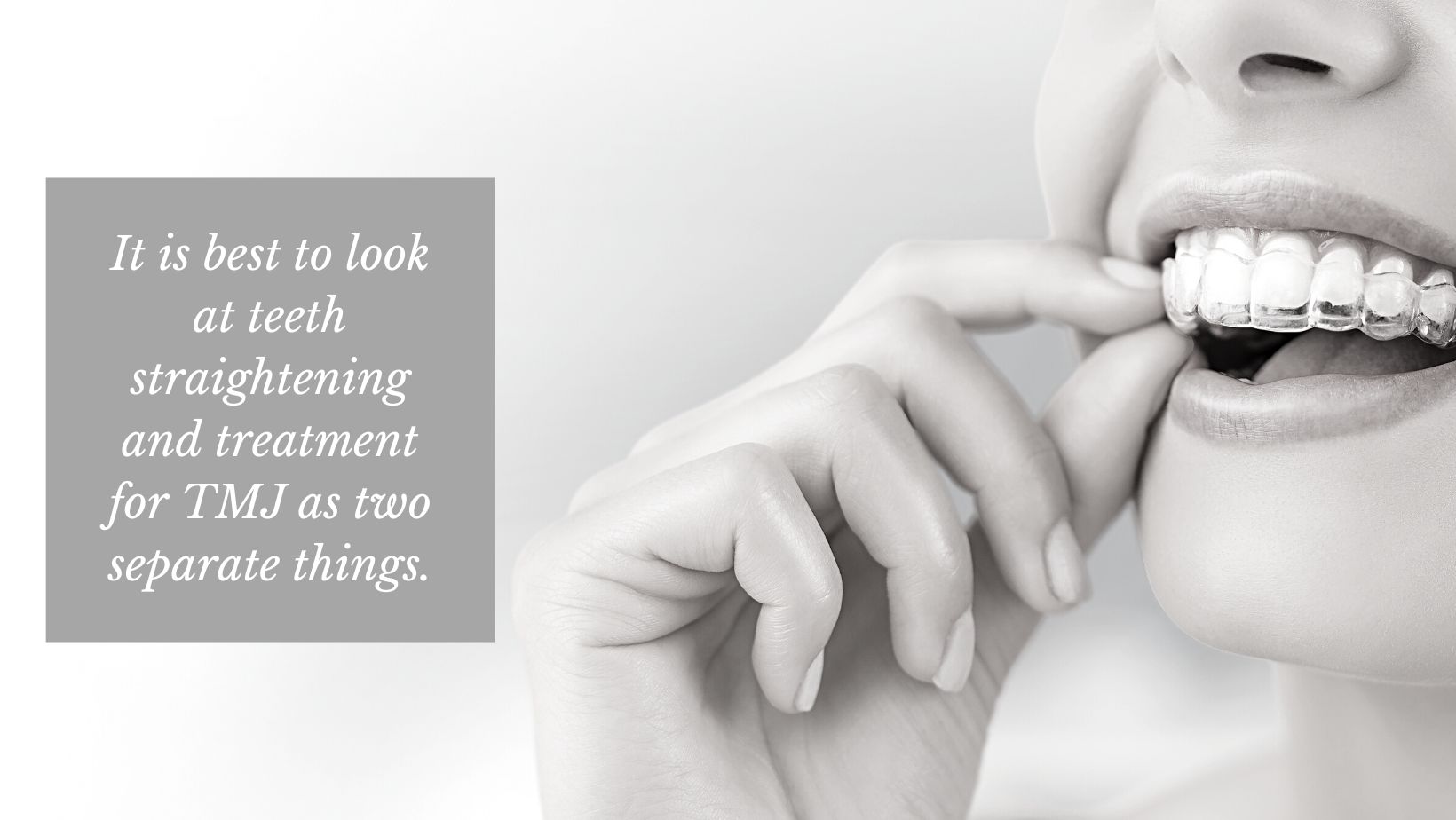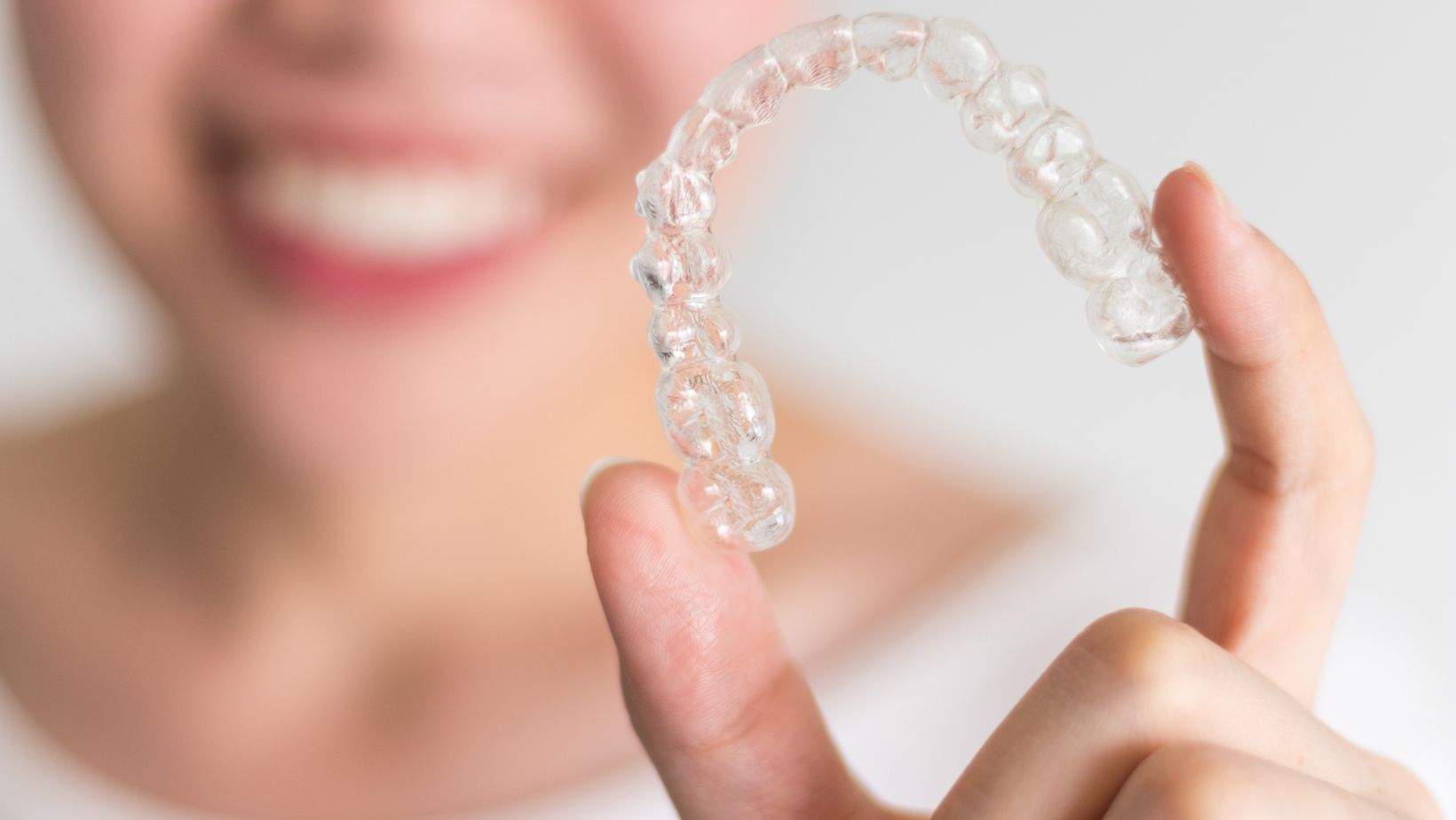Temporomandibular joint disorder (TMJD or TMJ for short) causes jaw pain and discomfort for roughly 11 to 12 million adults in the United States. TMJ can be a medical issue involving the structure of the jaw, or a dental issue resulting from misaligned teeth or overcrowding. The nature of the problem determines the best course of treatment.
If the case of TMJ is primarily a dental problem, it may be resolved with orthodontics. Can Invisalign help with TMJ? Possibly, although the plastic aligner trays are not specifically meant for that purpose. The success a patient has with Invisalign and TMJ problems depends on several factors.
What is TMJ?
The temporomandibular joint acts like a hinge connecting the lower jawbone to the skull. Disorders can arise from a number of things such as injuries to the jaw, stress placed on the joint by teeth grinding, or arthritis. Malocclusions (overbite, underbite, or crossbite) or very crooked teeth can also interfere with how the jaw works when a person chews, talks, or yawns.
Symptoms range from clicking and popping whenever the jaw opens and shuts to severe pain. A patient might also have episodes where the jaw locks up.
It is important to understand that TMJ is a disorder of the jaw and may or may not have anything to do with the teeth. A patient could have beautiful straight teeth and still have TMJ. Likewise, they could have very crooked teeth and never experience jaw problems at all.
A dentist might recommend orthodontia for some cases of TMJ. Other cases may need more traditional TMJ treatments. Depending on the severity of the disorder, these can include mouthguards, physical therapy, surgery, injections, or even counseling for the underlying stressors that cause chronic jaw clenching.
Since Invisalign’s purpose is to straighten crooked teeth, it may not have any effect on someone’s TMJ. Then again, if the crookedness is what is responsible for the jaw issues, Invisalign’s straightening treatment could bring some relief.
When Can Invisalign Help With TMJ?
Invisalign is best for mild to moderate crookedness, crowding, and gaps between teeth. More severe problems, including extreme problems with how the teeth come together (malocclusions), are often better suited for braces.
If TMJ symptoms are caused solely by alignment problems, and the patient’s chosen orthodontic treatment is good at fixing those problems, it might do the trick. In general, Invisalign will have better success if the alignment issues are minor. As the teeth gradually move into place the patient should start to feel some relief from their TMJ symptoms.
For TMJ caused by teeth grinding (called bruxism) Invisalign can have an added benefit. The plastic aligner trays act as a bite guard, creating a buffer between the upper and lower teeth so they do not rub together. And since Invisalign is switched out every two weeks, there is little chance of bruxism having time to damage the trays.

Can Invisalign Cause TMJ or Make it Worse?
There is no indication that Invisalign causes TMJ. But there are some cases where Invisalign treatment seems to have aggravated symptoms for patients who already have TMJ. It is changing the patient’s bite, after all. These cases are purely anecdotal, and there has been no formal research to prove Invisalign is detrimental.
For some perhaps the thin layer of plastic is enough to interfere with the jaw’s normal movements. It might cause these patients to clench or hold their jaw at an unnatural angle instead of a neutral position. Since every patient’s jaw and TMJ is different, it is hard to determine who might have problems with Invisalign and who will do just fine.
Patients with TMJ should make sure their dentist is aware of their condition when considering Invisalign. The dentist, seeing how the teeth need to move, might recommend a different method for straightening. If they agree that alignment trays are the best method, the dentist will monitor the patient and keep an eye out for any possible Invisalign and TMJ problems.
Are Braces or Invisalign Better for TMJ?
Since neither braces’ nor Invisalign’s main purpose is to “cure” TMJ, it is a toss-up as to which one is better for a patient with TMJ. Again, it depends on whether the problem the patient is trying to fix is connected to the jawbone’s placement or just the teeth.
Braces use more force to move the teeth than Invisalign, which is why they tend to work better for more severe problems. The dentist or orthodontist might recommend one over the other if they think it will do more to alleviate the patient’s TMJ symptoms. Likewise, they might make a recommendation based on which one is more likely to not make the issue worse.
What You Should Know About Invisalign If You Have TMJ
A number of different professionals provide help with TMJ, including oral surgeons, maxillofacial surgeons, otolaryngologists (ENTs), and prosthodontists. A patient who has been diagnosed with TMJ might already be working with one of these specialists for treatment. They will be able to provide an opinion on the best choice for teeth straightening for that particular patient.
Many people have symptoms and suspect they have TMJ but have not been diagnosed. These concerns should be brought up with the dentist or orthodontist when discussing options for straightening teeth.
If Invisalign does become the chosen treatment, it is important to understand that while Invisalign might help with TMJ symptoms, it is unlikely to be a cure. Patients must also be aware that realigning teeth with Invisalign can cause some discomfort. For someone already suffering from TMJ pain, this could be a concern.
Getting a proper fit for Invisalign trays is important too. Treatment includes regular dental appointments to check progress. The dentist can ensure the trays fit properly and are not causing undue stress on the jaw. This is a good reason to opt for treatment that includes dental supervision. There are at-home, DIY products that require patients to do their own dental impressions. This could result in ill-fitting alignment trays that could end up worsening TMJ.
Is Invisalign Right for You?
Patients with TMJ should be mindful of how any teeth straightening method might affect the disorder. It is possible that Invisalign can help with TMJ, but only if the patient’s crooked or crowded teeth are the problem.
It is best to look at teeth straightening and treatment for TMJ as two separate things. While it is possible for braces or Invisalign to help with TMJ, it is not what they are meant for. And once the teeth are straightened, additional treatment might be necessary to fix the TMJ problem.
The first step to straighter teeth—or a TMJ solution—is to discuss all available options with the dentist. Use our online search tool to find and make an appointment with one in your area.


